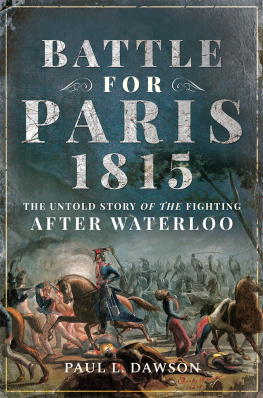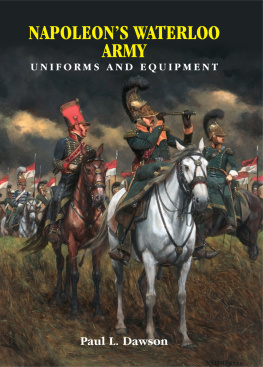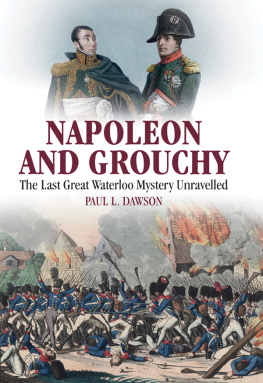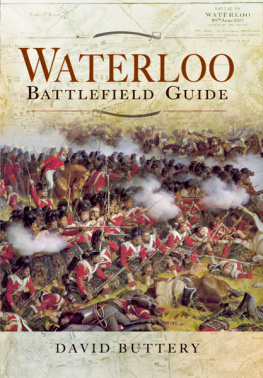
BATTLE FOR PARIS 1815
Dedication
To David W Paget. Thank you for over twenty years of friendship and excellent company.
Acknowledgements
I n the preparation of this book I would like to thank all those who have offered advice and support. I would like to thank all those who have helped me with my research. I never planned to write on Waterloo, and at long last this is my fourth, but possibly not my last volume, on those intriguing and fateful days of 200 summers ago.
Thank you to Captain Sbrava of Service historique de la Dfense for granting me unique access to regimental muster lists that have been off limits to researchers due to the poor condition of these documents. Permission was granted at the time of Waterloo Truth at Last going to press, so the details of these documents are presented in this work, along with comments on the fate of the men at Waterloo.
Furthermore, I am indebted to Jean Charles Lair and his partner Hlne who must be singled out for compiling the casualty data for the 1st and 2nd cavalry corps from the regimental muster lists housed at Service Historique de la Dfence Arme du Tre, in Paris. Without their help, this book could not have been written. We have spent many hundreds of hours in Paris, and without their help, the work in collecting the research material would have taken far longer than the four years it has taken already.
I must also acknowledge the tremendous and most generous assistance in the provision of research material by Ronald Pawly and Yves Martin of digital images of material at Archives Nationales and Service Historique de la Dfence Arme du Tre, in Paris. Ronald has been of great help in our many hours of discussion and debate on the campaign and sources available to researchers. Bravo gentlemen.
Pierre de Wit needs to be thanked for his assistance, and I urge readers to his excellent online study of the campaign. Professor A. Pollard needs to be thanked for his friendship and ongoing support of my work on Waterloo.
Lastly, the long-suffering staff at Service Historique de la Dfence Arme du Tre, in Paris need to be thanked for answering questions and locating items of research that have made this the fourth volume in my series of books on the campaign of Waterloo possible.
Paul Dawson BSc Hons MA FINS
Wakefield 30 October 2018
Introduction: Waterloo again?
N ot another book on the Waterloo campaign? Well yes and no. Most histories of the Hundred Days Campaign stop with Waterloo. Yet the French Army fought on until 3 July 1815. This book seeks to describe these events and show how the most maligned of Napoleons marshals saved his army and that of Napoleons beaten at Waterloo. Using archive material that has never been published in French or English before, the details of what occurred after Waterloo are presented, with episodes discussed for the first time since they occurred over 200 years.
Grouchy was the last of Napolons marshals. Emmanuel, Second Marquis de Grouchy, walked with a limp and was nearly 50-years-old. A career soldier, with a service record of thirty-six years, having served King, Revolution, Consulate and Empire; he originally enlisted in the Corps Royal dArtillerie in 1779. Perhaps thanks to his intellectual mother, Gilberte Freteau de Peny, and his sister, the early feminist, Sophie de Condorcet, Emmanuel Grouchy, became an ardent supporter of the youthful French Republic. His military record shows that he fought in many of the major battles of the Republic and early years of the Empire. His service history shows that Grouchy was an able divisional and corps commander, had taken field commands in the campaign of 1806 and 1807, had served in Spain briefly as a governor, and led Prince Eugenes cavalry in the 1809 campaign. He took command of the 3rd Cavalry corps in 1812 and served with distinction in the 1814. Following Waterloo, whilst in exile in America, he struck up a remarkable friendship with Thomas Jefferson.
Yet for many, primarily due to the Dino de Laurentis film Waterloo , Grouchy is the bumbling buffoon strawberry eater who failed to march to Waterloo. This vision of an incompetent man, promoted beyond his abilities, has stuck to Grouchy. The film Waterloo has done more harm to his reputation than any other. This image has stuck on the public imagination. Grouchy lost Waterloo.
Despite what many historians suggests, Grouchy acquitted himself marvellously during the campaign. He was an excellent administrator, and the truth of the matter is, he was an excellent choice to command the right wing of Napoleons army. His retreat to Paris is a text book fighting retreat, yet few remember him for this. This book traces what Grouchy did after Waterloo was lost, until he was stripped of command by Davout on 30 June 1815.
Inevitably, in looking at the events after 18 June, we have to re-visit many episodes of the campaign covered in my book on Grouchy. I make no apologies for that, as in order to discuss the events from 19 June onwards for the right wing of the Arme du Nord, ground already covered has be to be revisited briefly to set the events into context. Indeed, in some cases new information is presented. Where this material challenges my earlier thesis, I put my hands up and say I got this wrong in the light of new information, but overall, particularly on Grouchys culpability, the more documents we find from those fateful days, the more innocent Grouchy becomes of the crimes he supposedly committed. The discovery of a letter dated 20 June 1815 concerning the cannonade of Waterloo being heard by Grouchy, enables us to demolish a lot of myths about that episode. General Exelmans, seen for 200 years as a critic of Grouchy, suddenly becomes his supporter, it is also conclusive proof that Exelmans did not suggest alternative routes to Waterloo this was merely him after the event trying to paint his own actions in the most favourable light possible, and to slander Grouchy. As an author, I have a bias, but what I have done my best to do, is to present all the information from the proand anti-Grouchy factions, to show the reader how I came to my conclusions. The nature of historical research means, that as critical and evaluative historians, we are also desiring to critique our own work and progress the study of our chosen field. Since writing my book on Grouchy for Frontline, my research has been on-going. The discovery of a huge tranche of material in the French Army Archives has added greatly to my understanding of what happened for the right wing of the Arme du Nord.
Note on the sources
With this book, as far as has been possible, I have sought primarily to use documents written during the period of 18 June to 4 July 1815. Grouchy and his part in the fateful days of June 1815 have, ever since they happened, become dominated by two factions, either for or against Grouchy. In their arguments both sides narration of the events of June 1815 are dominated by hindsight and above by personal and political interests. Grouchy has been accused of being one of the determining causes, if not the cause, of the defeat of the Emperor at Waterloo. As a result of this, it is very hard to get down to the nub of the issues at hand due to complex self-interest of the men from 1815, and from later historians. What I aim to do with this book is to judge Grouchy as far as possible, from his actions as they happened in 1815 and where needed, to expose aspects of those events as either truth or lies. This is only possible with a thorough examination of all the original documents from 1815 that can be located in archives in Europe. By original, I mean documents that were written in June 1815, and not decades later, or are copies of lost originals but more of that later.
Next page







